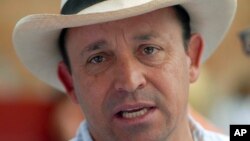The brother of former Colombian President Alvaro Uribe was arrested Monday on allegations he was involved in murders and forced disappearances while helping form a far-right death squad in the 1990s.
Santiago Uribe has long denied any involvement in killings attributed by a former police captain to a group known as the “12 Apostles.'' It allegedly plotted dozens of slayings from an Uribe family cattle ranch in northern Antioquia state.
Uribe was arrested in Medellin and charged with murder and conspiracy.
His brother is traveling in the U.S. and has not commented. But the former president has long asserted his brother's innocence and accused his successor, President Juan Manuel Santos, of wielding the threat of prosecution against his brother to stymie the rise of Uribe's conservative Democratic Center movement.
Santiago Uribe has largely eschewed politics, dedicating himself instead to cattle ranching and raising fighting bulls.
Retired police Maj. Juan Carlos Meneses said in a 2010 interview with The Associated Press that as the head of police in the town of Yarumal starting in 1994, he received monthly payments from the group to look the other way as it murdered around 50 drug addicts, thieves and cattle rustlers in the area.
He said Santiago Uribe ran the death squad from the La Carolina ranch using short-wave radios and that he once saw 15 uniformed paramilitaries with R-15 and AK-47 rifles at the ranch doing physical training on an obstacle course.
Around the same time, Alvaro Uribe became governor of Antioquia state.
As president between 2002 and 2010, he leveraged some $700 million in annual aid from Washington to decimate leftist rebels, winning domestic popularity but drawing complaints from human rights groups about tactics and the military's behavior.
Meneses, who in 2014 returned from self-imposed exile in Venezuela and handed himself over to authorities, said he had no evidence linking the former president to the death squad.




